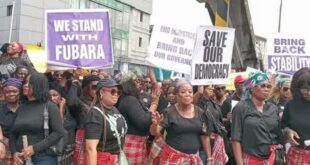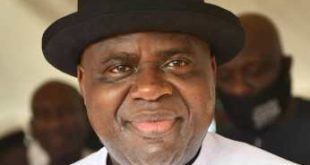By Mandy Tina
The Trade Union Congress of Nigeria (TUC) has demanded for an upward review of national minimum wage from thirty (N30,000.00) to four hundred and forty-seven thousand Naira per month.
A statement signed by the union’s secretary general, Comrade Nuhu Toro, states that Nigerian workers can no longer survive with N30,000.00 naira minimum wage following the economic hardship on daily basis.
The union maintained that the purpose of minimum wage is to protect workers against undue low pay, ensure a just and equitable share of the fruits of progress to all, reduce poverty, inequality, including those between men and women, by positioning the right to equal remuneration for work of equal value.
They emphasized that across other African countries, Nigeria pays the lowest and poorest minimum wage to her workers.
The statement reads, “It will be recalled that the last minimum wage review exercise was done in the year 2019 – about five years ago. Section 3(4) of the National Minimum Wage Act 2019 states that “the national wage agreement expires after five years and it shall be reviewed in line with this Act”.
“The 2019 minimum wage Act was signed into law by President Muhammadu Buhari on 26 April, 2019, thus will expire by April, 2024.
“The Organised Labour, comprising the Trade Union Congress of Nigeria (TUC) and the Nigeria Labour Congress (NLC) in collaboration with Civil Society Coalitions, over the years have intensified their call for the upward review of the National minimum wage.
“With the setting up and inauguration of the Tripartite Committee to handle the negotiation of a new National Minimum Wage for Nigeria by President Bola Ahmed Tinubu (GCFR), it has become imperative for the process to be fast tracked so as to enable workers breathe a sigh of relief considering the excruciating conditions they are forced to live with daily.
“Looking at the minimum wage that is in operation in so many African countries, it is discovered that Nigeria has been totally left behind as what we have as National Minimum Wage is nothing but a deceit that is borne to keep an average worker perpetually poor. Out of the eight countries surveyed, Equatorial Guinea has the least amount as minimum wage which is $224 per month.
“This is way off to that of Nigeria which is $20 per month. The difference in minimum wage in Equatorial Guinea compared to Nigeria is 1,195%. The National minimum wage being asked for through this memorandum i.e. ₦447,000/month (an equivalent of $380/month) is therefore apt for now”.
The congress further gave justification for the minimum wage increase as follows: “The continuous devaluation of the Naira has resulted in the astronomical increases in the prices of almost everything Nigerians consume because our country is highly import-dependent.
“As at the last minimum wage review in 2019, one Dollar was exchanged for N325.00. A Dollar now exchanges for over N1,500.00 – an increment of almost 500%. This has reflected on the prices of basic goods consumed by Nigerians because as earlier noted – Nigeria is import-dependent for almost all supplies.
“Prior to the National minimum wage review of 2019, petrol was selling for N145 a litre and that price dictated the price levels that were in operation in the country at that period. Immediately the N30,000 minimum wage was implemented, the petrol price was jerked up to N167 per litre.
“With the total removal of fuel subsidy on petroleum in 2023, the price is now way above N600 per litre and prices of almost all the basic needs of life including transportation, accommodation, food stuff, school fees, utility bills etc. had gone to the roof top. The new price levels have thus made a mincemeat of the minimum wage of N30,000/month. The urgent need for an upward.
“According to the recent statistics from the National Bureau of Statistics (NBS), approximately 70 million people are in active labour force. The 2023 data from World Poverty Clock pegged the number of extremely poor Nigerians at 71 million, this is very dangerous.
“In addition to that, the NBS says the inflation rate in the country has risen to about 29 percent (twenty-nine percent) in January 2024, food inflation has skipped to over 30 percent. This brutal reality has deepened the poverty level through the erosion of purchasing power of workers.
“Something substantial must therefore be done urgently to avoid productivity plummeting to a level that may dash the hope of any economic revival in the next foreseeable future.
“Continuous Increase in Electricity Tarrif
Electricity tariff has continued to be on increase since the N30,000.00 minimum wage was implemented in the country. Statistics shows that per unit of electricity as charged by the distribution companies (DISCO’s) has increased from N32.50k to over N46.00 which is an increase of 41.5 percent”.
 PH Mundial – Port Harcourt Online Newspaper News Across The Region
PH Mundial – Port Harcourt Online Newspaper News Across The Region





